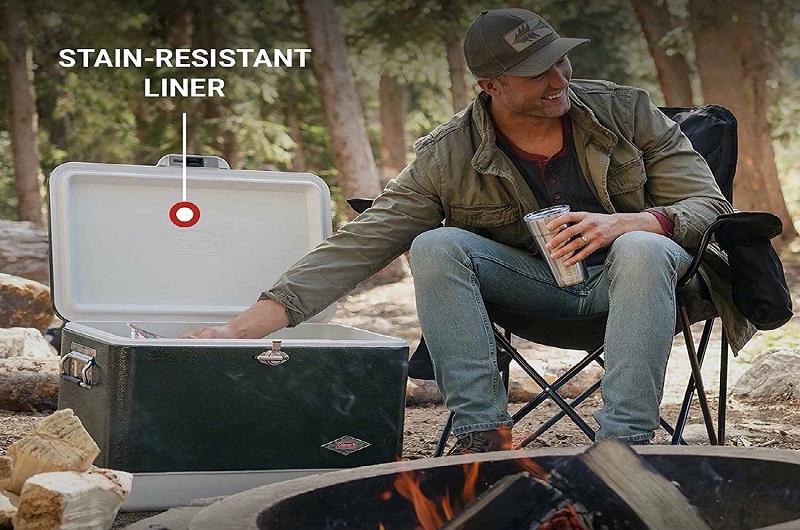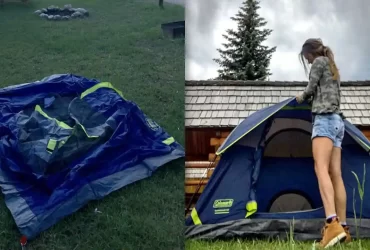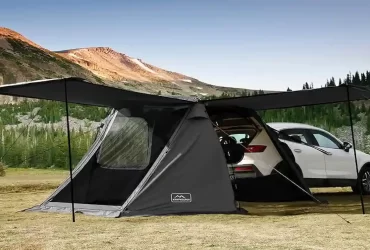Packing eggs for camping is an essential task if you want to have a hearty breakfast while on a hike. Eggs are not only delicious but also packed with protein, making them a great addition to any camping trip. However, packing eggs for camping requires some extra care to ensure they don’t break or spoil during transport.
Choosing the right container for packing eggs is crucial. A hard-sided cooler or an egg carton can protect the eggs from being crushed by other items in your backpack. If you don’t have either of these containers, you can use a plastic container with a tight-fitting lid.
To prevent the eggs from cracking, use a protective layer like bubble wrap or paper towels. Wrap each egg individually and place them snugly in the container. The protective layer will cushion the eggs and prevent them from moving around during transport.
There are many fun ways to do it while camping. One option is to boil them in advance and store them in their shells until ready to eat. Another option is to crack them into a non-stick pan over low heat and scramble them with some salt and pepper.
If you’re feeling adventurous, try making an omelette using fresh ingredients like mushrooms, bell peppers, and cheese. To make this dish even more exciting, cook it over an open fire using a cast-iron skillet.
Hard-boiled Eggs

Boiling eggs in advance is a great idea for camping trips. Not only does it save time and effort, but it also provides a hot breakfast option that can be enjoyed on-the-go. Pre-boiled eggs are easy to pack and can last up to a week in the fridge, making them a convenient and practical choice for multiple days of your camping trip.
To boil the eggs in advance, simply place them in a pot of boiling water for around 10 minutes. Once they’re done, remove them from the heat and let them cool before packing them. It’s important to make sure they’re fully cooled down before putting them in your cooler or fridge to avoid any bacteria growth.
Having pre-boiled eggs on hand can save you time and energy in the morning when you’re trying to get ready for the day ahead. Instead of having to start a fire or set up a stove, all you need is some hot water to warm up your pre-cooked eggs. This makes it an ideal option for those who want to spend more time exploring nature rather than cooking meals.
Furthermore, hardboiled eggs are packed with protein and nutrients that provide sustained energy throughout the day. They’re also low calorie and low carb, which makes them an excellent choice for those who are watching their weight or following specific diets.
In addition to being nutritious and convenient, pre-boiled eggs can also be used as an ingredient in other camping meals. For example, they can be chopped up and added to salads or sandwiches for extra flavor and protein. They can even be mashed up with avocado or hummus for a quick snack on-the-go.
You may also like this:
Benefits of Using Powdered Eggs

Lightweight and Convenient
Powdered eggs, also known as egg powder, are a great alternative to fresh eggs when you’re planning a camping trip. They are lightweight, easy to pack, and convenient to use in various recipes. The benefits of using powdered eggs for your next outdoor adventure.
Longer Shelf Life
One of the biggest advantages of using egg powder is its longer shelf life compared to fresh eggs. This makes it an ideal option for extended camping trips where refrigeration may not be available. Egg powder can be stored in an airtight container or resealable bag and kept at room temperature without spoiling. This means you can have access to fresh-tasting eggs without worrying about them going bad.
Versatile Ingredient
Egg powder is versatile and can be used in many different recipes, including baking and cooking. It’s perfect for making scrambled eggs, omelets, pancakes, waffles, and even cakes and cookies. You can also use it as a binding agent in meatloaf or meatballs. Egg powder is an excellent ingredient that adds flavor and nutrition to your meals while being easy to prepare.
Separate Yolk from White with Ease
If you need only egg whites for specific recipes like meringues or angel food cake, then egg whites in powder form are available too! This makes separating the yolk from the white so much easier than with fresh eggs. Simply mix the required amount of egg white powder with water until stiff peaks form.
Rehydrating Powdered Eggs: Dos and Don’ts
Rehydrating powdered eggs is an excellent option for people who want to save time and space while camping or backpacking. However, it’s essential to understand how much water and powder you need to make the perfect rehydrated eggs. The first step is always to measure your ingredients accurately.
When measuring powdered eggs, a general rule of thumb is that one tablespoon of powder equals one large egg. Therefore, if you plan on making scrambled eggs for two people, you’ll need four tablespoons of egg powder and eight tablespoons (or half a cup) of water.
However, keep in mind that different brands may have varying instructions regarding their egg-to-water ratio. Always check the label or manufacturer’s website before preparing your dehydrated eggs.
Stir Well
Once you’ve measured out your powdered eggs and water, mix them thoroughly until the powder dissolves entirely into the water. If any lumps remain after stirring, use a fork or whisk to break them up until the mixture is smooth.
It’s crucial to stir well because undissolved particles can cause clumps in your final product, which will affect its texture and flavor. Plus, consuming uncooked egg powder can be dangerous as it may contain harmful bacteria such as Salmonella.
Cook Thoroughly
After mixing your dehydrated eggs with water, cook them immediately over medium heat until they’re fully set. Make sure there are no runny parts left before serving.
Undercooked eggs can harbor bacteria like Salmonella and E.coli that cause food poisoning symptoms such as vomiting, diarrhea, fever, stomach cramps within hours or days of consumption.
Dehydrated Eggs

Dehydrated eggs are an excellent option for campers who want a lightweight and convenient source of protein while on their adventures. They’re easy to pack, and you can use them to make scrambled eggs, omelets, or even baking recipes that call for eggs.
Moreover, dehydrated eggs have a much longer shelf life than fresh eggs. If stored correctly in an airtight container in a cool and dry place, they can last up to ten years. Always check the expiration date on your egg powder before using it.
Packing Whole Eggs in Secure Containers
When packing for camping trips, it’s important to ensure that your food stays fresh and secure. Packing eggs can be a challenge as they are fragile and prone to breakage. However, with the right techniques, you can pack whole eggs safely and securely.
Using an Egg Carton or Airtight Container
One of the best ways to pack whole eggs is by using an egg carton or an airtight container. This will prevent the eggs from breaking during transportation and keep them safe from contamination. It’s important to choose a container that fits the number of eggs you plan on packing.
For added protection, wrap each whole egg in paper towels or cloth before placing them in the container. This will help absorb any shock or impact during transportation and reduce the risk of breakage.
Using an Egg Holder or Plastic Container

If you’re planning on packing a dozen eggs, using an egg holder or a plastic container with dividers is recommended. This will keep the eggs from moving around during transportation and prevent them from hitting against each other, which could cause breakage.
It’s important to note that whole eggs take up more space than scrambled or fried eggs. If you plan on cooking the eggs for breakfast, consider packing scrambled or fried eggs instead of whole eggs to save space and reduce the risk of breakage.
Packing Liquid Eggs
Liquid eggs are another option for camping trips as they are convenient and easy to transport. They come in cartons or pouches and can be packed in a lock bag for added security.
While liquid eggs may not have the same texture as fresh whole eggs, they are still a great option for quick breakfasts while camping. Plus, they take up less space than whole eggs and don’t require additional packaging materials like paper towels or cloth.
You may also like this:
Precrack Eggs into a Water Bottle or Mason Jar

Packing eggs can be a tricky task. They are fragile and prone to breakage during transportation, which can result in a mess in your cooler or backpack. Precracking eggs into a water bottle or mason jar is an excellent solution to this problem. Here’s how you can do it:
Use a Suitable Container
To avoid leaks and breakage, choose a plastic bottle or Nalgene bottle with a secure lid. These containers are durable and will protect the eggs from damage during transport. Make sure that the container you choose is large enough to accommodate the number of eggs you want to pack.
Whisk the Eggs Before Pouring Them into the Container
Before pouring precracked eggs into the container, whisk them with a fork or whisk until they are evenly mixed. This step ensures that your scrambled eggs will have consistent texture when cooked.
Add Paper Towels for Extra Protection
To provide extra cushioning and absorb any liquid that may leak out of the container, place paper towels around it before packing it in your cooler or backpack. This step helps prevent any potential messes.
Different Ways You Can Precrack Eggs
There are different ways you can precrack eggs depending on what equipment you have available. One way is to use a funnel attached to the top of your water bottle or mason jar as an egg separator. Crack one egg at a time over the funnel so that only the egg whites go through while keeping the yolk intact.
Another way is to crack all of your eggs into a bowl first and then pour them into your chosen container using either a ladle or measuring cup with spout for easy pouring.
How Long Do Precracked Eggs Last?
Precracked eggs should be used within two days if refrigerated correctly at 40°F (4°C) or below. It’s essential to keep them cold to prevent the growth of harmful bacteria.
What to Do with the Shells
Don’t forget to dispose of the eggshells properly. You can either throw them in the trash or use them for composting.
Using a Cooler to Pack Eggs for Camping
Sided Cooler

A sided cooler is the ideal option. Not only does it provide ample space to store your eggs, but it also keeps them at the right temperature to ensure their freshness and quality.
To pack your eggs in a cooler, start by selecting a high-quality cooler with thick walls and an airtight seal. This will help maintain the temperature inside and prevent any external heat from entering. Once you have your cooler, place the eggs in an egg holder or carton and position them securely inside the cooler. Make sure they are not touching each other or the sides of the cooler.
Insulated Bag
If you don’t have a sided cooler, an insulated bag can be used as an alternative to keep your eggs fresh during camping trips. These bags are designed to keep food items at the right temperature and can be easily transported from one location to another.
To use an insulated bag for packing eggs, simply place them in an egg holder or carton and put them inside the bag. Add ice packs or frozen water bottles around the egg cartons to help maintain their temperature during transportation. It’s important not to let the eggs come into direct contact with ice or cold water as this can cause them to freeze.
Ice Packs or Frozen Water Bottles

Ice packs or frozen water bottles are essential when it comes to maintaining the temperature inside your cooler during camping trips. These items help keep everything cool and fresh while preventing spoilage due to excessive heat exposure.
When using ice packs or frozen water bottles in your cooler, make sure they are positioned around the egg cartons rather than on top of them. Placing them directly on top of the eggs can cause freezing which leads to damage.
Camping Egg Holder

A camping egg holder is a great tool to have when packing eggs for camping trips. It helps keep the eggs in place and prevents them from cracking during transportation.
To use a camping egg holder, simply place the eggs inside and secure them with the lid. This will ensure that they remain intact during bumpy rides or uneven terrain.
Freezer Bag

If you’re backpacking instead of car camping, a freezer bag can be used as an alternative to a cooler for packing your eggs. These bags are lightweight and easy to carry, making them ideal for backpacking trips.
To pack your eggs in a freezer bag, place them in an egg carton or holder and put it inside the bag. Add ice packs or frozen water bottles around the carton to help maintain their temperature during transportation.
You may also like this:
Coating Eggs with Mineral Oil for Preservation

Eggs are a staple in many households, and they are used in various recipes. However, eggs can spoil quickly if not stored correctly. One way to extend their shelf life is by coating them with mineral oil.
Creating a Protective Layer
Mineral oil is commonly used for preserving eggs because it creates a protective layer that seals the eggshell and extends its shelf life. The oil does not penetrate the eggshell and does not affect the egg’s taste or quality. Applying mineral oil to unwashed eggs before storing them in a cool and dry place can help maintain their freshness for up to several months.
Preserving the Cuticle
The cuticle is a natural coating on the eggshell that helps prevent moisture loss and bacteria entry. However, washing eggs removes this protective layer, making them more susceptible to spoilage. Coating eggs with mineral oil helps preserve the cuticle and protect the egg from external factors that can cause spoilage.
Easy Application
Applying mineral oil to eggs is easy and straightforward. Start by cleaning any dirt or debris off of your unwashed eggs using a dry cloth or brush. Then, apply a thin layer of mineral oil over each egg using your hands or a clean cloth. Be sure to cover all sides of the egg thoroughly but avoid using too much oil as it may attract dust and debris.
Long-Term Benefits
Coating your eggs with mineral oil has long-term benefits such as extending their shelf life for several months without refrigeration. This method is especially useful for those who live in areas without access to refrigeration or who want to stock up on fresh eggs when they are available.
Safe Ways to Pack Eggs for Camping

Eggs are a staple in many camping meals, but they can be tricky to transport without cracking or spoiling. Fortunately, there are several safe ways to pack eggs for camping that will keep them fresh and intact until you’re ready to use them.
Use a Hard-Shell Container

One of the best ways to pack eggs for camping is by using a hard-shell container specifically designed for carrying eggs. These containers come in different sizes and shapes, depending on how many eggs you need to transport. They usually have individual compartments that hold each egg securely in place, preventing them from bumping into each other and cracking.
Wrap Each Egg Individually
Another way to protect your eggs during transportation is by wrapping each egg individually in paper towels or bubble wrap. This will provide an extra layer of cushioning that will help prevent any impact from breaking the shell. Paper towels are a great option because they absorb any moisture that may accumulate inside the container.
Keep Them Cool
It’s essential to keep your eggs cool while transporting them, especially if you’re going on a long trip. Place the egg container in a cooler with ice packs to maintain a consistent temperature. This will help prevent spoilage and keep your eggs fresh until you’re ready to use them.
Avoid Heavy Items
When packing your cooler or backpack, avoid placing heavy items on top of the egg container as this could crush them. Instead, put it on top of other lightweight items such as bread or fruits.
Use Fresh Eggs
To ensure that your eggs last longer while camping, use fresh ones and consume them within a few days of packing them. Avoid using cracked or dirty eggs as they may spoil faster than clean ones.
Are Farm-Fresh Eggs Bad for Camping?

Packing the right food is crucial. One of the most important foods to pack is eggs. Not only are they a great source of protein, but they can be cooked in many different ways. However, some campers are concerned about the safety of farm-fresh eggs and whether or not they are safe to consume while camping.
The Risks of Consuming Farm-Fresh Eggs While Camping
One of the main concerns farm-fresh eggs may be at a higher risk due to their lack of processing and pasteurization.
It’s important to note that not all farm-fresh eggs are contaminated with salmonella. However, there is no way to know if an egg has been contaminated just by looking at it. This means that campers who choose to consume farm-fresh eggs while camping may be putting themselves at risk for food poisoning.
How to Safely Consume Farm-Fresh Eggs While Camping

While there is a risk associated with consuming farm-fresh eggs while camping, there are steps you can take to reduce this risk and safely enjoy your breakfast in the great outdoors.
Firstly, make sure you purchase your eggs from a reputable source. Look for farms that practice good hygiene and have clean facilities for their chickens. Ask if their chickens have been vaccinated against salmonella.
Secondly, store your eggs properly while camping. Keep them in a cooler with plenty of ice or frozen gel packs. Make sure they are stored away from any raw meat or poultry products.
Lastly, cook your eggs thoroughly before consuming them. This means cooking them until both the yolk and white are firm. Avoid eating raw or undercooked eggs, as this increases your risk of salmonella contamination.
Easy Methods for Packing Eggs for Camping
Selecting the right kind of eggs is crucial. You don’t want to end up with a mess of broken yolks and shells in your cooler or backpack. So, what kind of eggs should you choose? The answer is simple: go for hard-boiled eggs. Hard-boiled eggs are easy to pack, require no refrigeration, and can be eaten as a snack or added to meals.
To boil eggs for camping, start by placing them in a pot of cold water. Bring the water to a boil over high heat, then reduce the heat and let the eggs simmer for 10-12 minutes. Once done, transfer them to a bowl of ice water and let them cool completely before peeling.
Packing Hard-Boiled Eggs for Camping
Now that you have your hard-boiled eggs ready, it’s time to pack them for your camping trip. There are several ways you can do this:
- Egg Cartons – If you have access to an egg carton, this is one of the easiest ways to pack hard-boiled eggs for camping. Simply place each egg in its own compartment and close the lid.
- Plastic Bags – Another option is to place each egg in a small plastic bag or wrap it in plastic wrap before placing it in your cooler or backpack.
- Tupperware Containers – If you’re looking for something more durable than an egg carton or plastic bag, consider using Tupperware containers with lids that snap shut securely.
- Egg Carrier – For those who camp frequently and want something specifically designed for carrying hard-boiled eggs, there are specialized egg carriers available on the market that hold up to 12 eggs at once.
No matter which method you choose, be sure to pack your hard-boiled eggs carefully so they don’t get crushed or damaged during transport.
Cooking with Hard-Boiled Eggs While Camping
One of the great things about hard-boiled eggs is that they’re incredibly versatile and can be used in a variety of camping meals. Here are some ideas to get you started:
- Breakfast – Slice up hard-boiled eggs and add them to breakfast burritos, sandwiches, or wraps.
- Salads – Chop up hard-boiled eggs and add them to any salad for extra protein.
- Snacks – Pack whole hard-boiled eggs as a quick and easy snack while on the go.
- Sandwiches – Add sliced hard-boiled eggs to sandwiches for an extra boost of protein.
- Tuna Salad – Mix chopped hard-boiled eggs into tuna salad for added texture and flavor.
With these tips in mind, packing eggs for camping should be a breeze! Just remember to choose the right kind of eggs, pack them carefully, and get creative with how you use them in your meals while enjoying the great outdoors.





Leave a Reply
View Comments